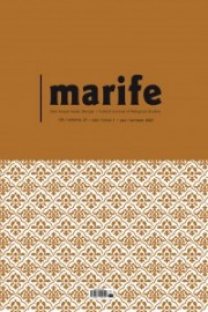Farabi’nin Medeniyet Tasavvuru ve Kurucu Metni Olarak -İhsâu’l-Ulum- Adlı Eserinin Tahlili
Farabi, İslam felsefesinin Meşşai (peripatetic) akımının kurucu âlimidir. İslamiyet’in o dönemdeki önemli kültür ve medeniyetlerle yüzleşmesi ve kendine özgü bir bilgi-bilim tasavvuru kurgulaması, ilimler tasnifi yapması onun Muallim-i Sani olarak nitelendirilmesine neden olmuştur. Bu makalede Farabi’nin İhsâu’l-Ulûm/İlimlerin Sayımı eserini medeniyet tasavvurunun kurucu metni olarak inceleceğiz. Çünkü “Felsefeye Giriş” kitabı olarak da değerlendirebileceğimiz bu eserinde Farabi dilin yapısı ve felsefesi ile analizine başlar ve bir nevi “düşüncenin grameri”ni ortaya koyar. Farabi’nin Tanrı-Evren ve İnsan kurgusu analiz edildiğinde, birey, toplum ve devlet ilişkilerinin nasıl olması gerektiği ve erdemli bir toplumun olabilirliği hususu ortaya çıkar. Medeni İlimler bağlamında hukuk, siyaset ve ahlak ilişkisini ele alıp, bunun ilahiyat ile irtibatını kurması Farabi’nin medeniyet tasavvurunun metafiziksel temellerini ortaya koymaktadır. Farabi’nin bu bağlamda daha anlaşılır olması, günümüz toplumsal ve siyasal tartışmalarına olası çözüm önerileri üretilmesine de katkı sağlayacaktır. Örneğin günümüzde tartışılan başkanlık sistemi, Farabi’nin devlet tasavvurunda başkanlık mı yarı başkanlık sistemi mi önerdiği ve günümüz parlamenter sistem açısından Farabi’nin siyasal sistem arayışlarına göndermeler yapılacaktır. Aynı zamanda güncel bireysel ve toplumsal soru(n)lara, İslam Felsefesinin teşekkülünde önemli etkisi olan âlimimiz ve eserinden mülhem okumalarla çözüm önerilerinin arttırılmasının sağlanması hedeflenmektedir
The Examination of Farabi’s Vision about Civilization and - İhsau’l-Ulum- as the Founder Text
When Farabi’s vision of God-Universe and Human was analyzed, it appears how the relationship among an individual, a society, and a state is supposed to be, and whether or not, it is possible to be a virtous society.The metaphysical foundations of Farabi’s vision of civilisation are to evaluate the relationship among the law, politics, and morality in the context of social and political disciplines, and to associate this relationship with the Theology. In this respect, making Farabi’s vision of civilisation more perceptible will contribute in providing possible solutions for modern-day societal and political controversies. For example, the present manuscript will refer to the presidental system, which is currently under debate, if Farabi offers the presidental system or semi- presidential system, and Farabi’s quest of a political system in terms of the current parliamentarism. Additionally, the article aims to improve solutions for modern-day individual and societal problems by understanding the philosopher, who have been a crucial character for the formation of Islamic Philosophy and reading his book properly
Keywords:
Farabi, Philosophy, Islam, Peripatetism, The Classification of Disciplines,
- Yayın Aralığı: Yılda 2 Sayı
- Başlangıç: 31.05.2001
- Yayıncı: Yediveren Kitap
Sayıdaki Diğer Makaleler
Vakf-İbtidânın Ayetlerin Anlaşılmasındaki Rolü
Osmanlı Dönemi Arap Şiirinde Taştîr
Müşkil Ayetler Bağlamında Zekeriya-Yahya Kıssası
el-Câhız ve Erken Mu’tezile Kelâmı
Hz. Mevlânâ’nın Eserlerinde Hadis Kültürü
Kazakistan’da Kur’an ve Tefsir Literatürü (Kazakça ve Rusça Eserler)
Farabi’nin Medeniyet Tasavvuru ve Kurucu Metni Olarak -İhsâu’l-Ulum- Adlı Eserinin Tahlili
